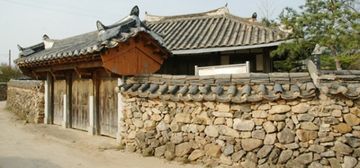도동사
| 도동사 Dodongsa Shrine |
|
 작성자 오인교, 南道 정자기행(2058)-고창 방호정사(方壺精舍), 한국매일 |
|
| 대표명칭 | 도동사 |
|---|---|
| 영문명칭 | Dodongsa Shrine |
| 한자 | 道東祠 |
| 주소 | 전라북도 고창군 신림면 가평1길 59 |
| 지정(등록) 종목 | 고창군 향토문화유산 제3호 |
|
|
|
해설문
국문
‘도동사’는 1928년에 지역의 유림들이 나라에 충성하고 절의를 도모하고자 방호 정사 안쪽에 지은 사당이다. 방호 정사는 한말 의병장 수남 고석진(1856~1924)이 후학을 가르치던 곳이다.
도동사에는 조선의 독립을 위해 순절한 의병 대장 최익현(1833~1906)을 중심으로 고석진, 고용진, 고예진 등의 위패가 안치되어 있다. 이들은 최익현을 따라 항일 의병에 참여했을 뿐만 아니라, 1919년에 한국의 독립 청원서를 파리 강화 회의에 보냈으며, 이로 말미암아 일제의 탄압을 받은 분들이다.
도동사는 2003년에 국가보훈처로부터 현충 시설로 지정되었다. 경내와 담장에는 개석식 고인돌*이 있다.
- 개석식 고인돌: 지하에 있는 매장 시설 위를 뚜껑처럼 덮개돌이 직접 덮고 있는 청동기 시대 고인돌의 한 형태
영문
Dodongsa Shrine
This shrine was founded in 1928 by the local Confucian community to commemorate Choe Ik-hyeon (1833-1906), a patriot and civil official of the Joseon period (1392-1910), as well as his students Go Yong-jin (1850-1922), Go Seok-jin (1856-1924), and Go Ye-jin (1875-1952), who were brothers and also prominent leaders of the Korean independence movement during the Japanese colonial period (1910-1945).
Choe Ik-hyeon served several high-rank official posts. When the illegal Japan-Korea Protectorate Treaty of 1905 was signed, he vocally insisted on its annulment and was among the first to initiate the anti-Japanese movement to support Korean sovereignty. At the age of 74, he led an armed civilian resistance movement, but eventually was arrested and sent to jail on Tsushima Island, where he went on a hunger strike and died. The three Go brothers continued leading the anti-Japanese movement after their teacher’s death and were among the ones who signed the petition sent to the Paris Peace Conference of 1919 demanding acknowledgement of Korea’s independence.
During the colonial period, the performance of rituals at the shrine was prohibited and was finally restarted in 1947, after the liberation of Korea in 1945. Originally, the shrine was dedicated only to Choe Ik-hyeon and Go Seok-jin. Go Ye-jin and Go Yong-jin were honored at the shrine beginning in 1962 and 1992, respectively. In 2003, the shrine was designated as a memorial facility by the Ministry of Patriots and Veterans Affairs. A yearly memorial ritual is performed in the 5th lunar month.
The shrine complex includes a main gate, a lecture hall called Banghojeongsa, an inner gate, and the shrine. Banghojeongsa is where Go Seok-jin taught his students.
영문 해설 내용
이곳은 조선 말기의 문신이자 애국지사인 최익현(1833-1906)과 최익현의 제자이자 독립운동가였던 고용진(1850-1922), 고석진(1856-1924), 고예진(1875-1952) 형제의 초상화와 위패를 모신 사당이다. 1928년 지역 유림들이 건립하였다.
최익현은 여러 고위 관직을 역임하였으며, 1905년 을사조약이 체결되자 무효를 주장하며 항일운동을 전개하였다. 74세의 고령으로 의병을 일으켰으나, 결국 체포되어 대마도로 유배되었으며, 단식으로 저항하다 숨을 거두었다. 고석진, 고용진, 고예진 형제는 스승의 뒤를 이어 항일운동을 하였으며, 1919년 파리강화회의에 보내는 한국의 독립 청원서에 서명하기도 하였다.
일제강점기에는 일제에 의해 향사가 금지되었다가, 1947년부터 다시 제사를 드리기 시작하였다. 원래 최익현과 고석진만 모시고 있었으나, 1962년 고예진을, 1992년 고용진을 추가로 모셨다. 2003년에 국가보훈처로부터 현충 시설로 지정되었으며, 매년 5월 제사를 올린다.
정문, 강당인 방호정사, 내삼문, 사당으로 구성되어 있다. 방호정사는 고석진이 후학을 가르치던 곳이다.
참고자료
- A Bird of Paradise, 다음 블로그 http://blog.daum.net/elegant0302/3285 -> 실제 사진
- 고창 신림면 도동사 개축 준공식, 전북일보, 2005.09.21. http://www.jjan.kr/news/articleView.html?idxno=164022 -> 2005년 개축 사실 확인 가능 / 매년 5월5일 유림들이 한자리에 모여 향사를 거행하고 있다.
- 항일의병 발상지 고창 동도사서 면암 추모제, 고창뉴스, 2009.10.11 https://www.gcnews.kr/read.php3?aid=12552261642400s27 -> 4인의 활동 내역 상세한 편 / 1947년부터 최익현과 고석진에게 제사를 드리기 시작해 1962년부터는 고예진을 추향하고 1992년부터는 고용진도 추향하여 현재에 이르고 있다.
- 南道 정자기행(2058)-고창 방호정사(方壺精舍), 한국매일, 2015.3.8. http://hankukmail.com/newshome/print_paper.php?number=26615 -> 네 사람 관계. ‘방호 정사’ 의미 / 사진 출처